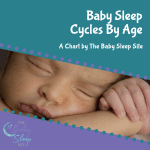
As you may know, it is important to have a consistent bedtime for your baby or toddler. But, what are the best baby bedtimes by age?
A good bedtime plus a good bedtime routine, is generally the first step in working toward baby sleeping through the night, and toward creating a predictable daily sleep and feeding schedule.
But what are the best bedtimes by age, exactly? A bedtime that’s too early may result in early-morning waking and short naps, but a too-late bedtime may make your baby overtired, which can lead to a whole host of sleep problems at night. Therefore, the best bedtimes by age depend on your unique baby’s sleep needs and development.
Not to worry, parents – as usual, we have the information you need! We’ve even organized it for you and everything – and we’ve made it printable! Stick this on your baby’s bedroom wall, put a copy in your diaper bag to reference when you’re traveling, and hand it out to friends at your morning moms’ group! Scroll down to find out how you can get a printable PDF version of this chart.
Average Baby and Toddler Bedtimes By Age
| Age | Total Sleep | Avg. Wake Time* | Bedtime | Notes |
|---|---|---|---|---|
| Newborn | 15-18 hours | Varies | N/A | Newborns need to eat frequently and will wake round the clock to feed, so a fixed bedtime is obsolete at this age. Watch your baby’s sleep cues closely, and put down for sleep at the first signs of tiredness. |
| 1-4 Months | 14-15 hours | Average awake time is 45 minutes to 2 hours | 7-10 p.m. | User the later bedtime for younger babies. By 3 or 4 months, you can gradually shift to using the earlier bedtime, as your baby (hopefully!) starts to sleep for one longer stretch at night. |
| 4-8 Months | 14-15 hours | Average wake time is 2-3 hours | 6-7:30 p.m. | Most babies are ready for a predictable schedule by about 6 months. Regular naps emerge at this time (4 naps at first, and then gradually moves to 3 naps). Use the earlier bedtime during the transition from 4 naps to 3, to ward off over tiredness. |
| 8-10 Months | 12-15 hours | Average awake time is about 3 hours | 6-7 p.m. | Most babies are taking 2 naps at this age. This is also prime time for the 8/9/10 month sleep regression! Use the earlier betimes if the regression has your baby napping less or waking more at night, and becoming overtired. |
| 10-15 Months | 12-14 hours | Average awake time is 3-4 hours | 6-8 p.m. | Stick with 2 naps, if possible; most babies aren’t ready to transition to one nap until 15-18 months. If your baby goes through the 12 month nap regression, use the earlier bedtime to make up for lost nap sleep. |
| 15 Months-3 Years | 12-14 hours | Average awake time is about 5 hours | 6-8 p.m. | Your toddler will transition to needing just one afternoon nap by about 18 months. That nap should be about 2-2.5 hours in length. Use the earlier bedtime during the transition from 2 naps to 1, and during the 18 month and 2 year sleep regressions, to make up for any lost sleep. By 2 years of age, you should start using 7:00 as your earliest bedtime; the 6:00 bedtime is more appropriate for younger toddlers. |
| 3-5 Years | 11-13 hours | Average awake time is about 12 hours, if toddler/preschooler is no longer napping | 7-8:30 p.m. | Most children give up the afternoon nap at this stage. Substitute an afternoon rest time for nap time. Try to time bedtime so that you allow for roughly 12 hours of night sleep, for children who are no longer napping. Use the later bedtime for children who are still transitioning away from the afternoon nap. |
*Average Wake Time refers to the amount of time your baby or toddler can comfortably stay awake during the day, between naps.
Printable Chart
Want to save and print this chart? Get a print-friendly PDF copy of Best Baby Bedtimes by Age!


Want FREE sleep help that you can put to use right away? Download a copy of our free guide, 5 Ways To Help Your Child Sleep Through The Night! The guide is available to download instantly. This means you can start using the techniques in it as early as tonight. So download now, and learn why your baby is waking at night – and what you can do about it.
Click here to learn more about how to get your free guide.
A better night’s sleep could be just a few clicks away. So don’t wait! Download now, and start your journey to better sleep tonight!








